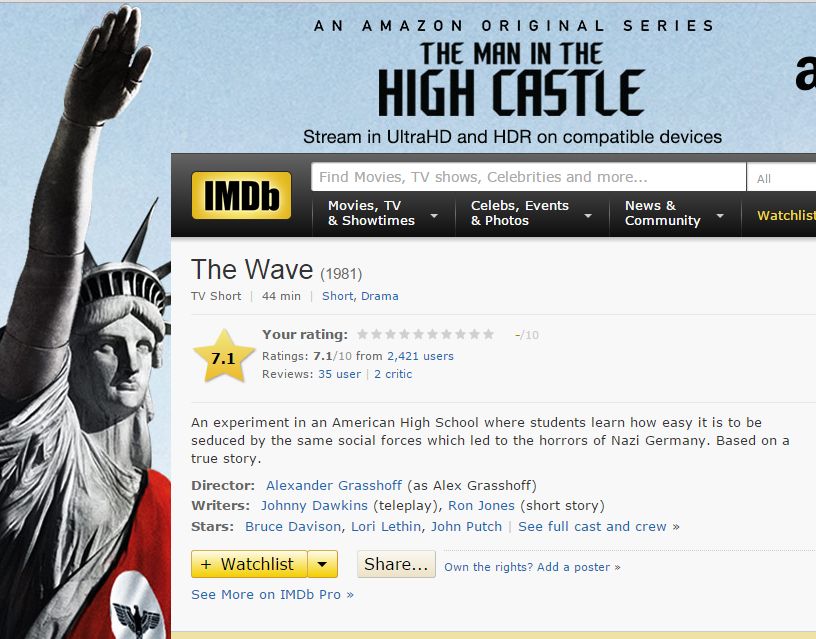

 ½
½
The Wave, on ABC
Amazon; IMDb; official site; TV.com; TV Tropes; Wikipedia
Caution: spoilers.
This special first aired in 1981 (when I was six years old). Two years later, it was aired as an ABC Afterschool Special (which is apparently what it was originally intended to be). However, I didn't get ABC in those days, and this probably would have gone over my head when I was that young, anyway. So as far as I recall, the first time I heard of it was when I saw it mentioned on facebook in December 2015, and then I watched it on YouTube. There's been a lot of talk recently about how much Donald Trump's current political campaign resembles Hitler's rise to power, and there's also been some hope that it might turn out he was just conducting his own social experiment like the one in this special. (Ironically, doing a web search for this special can lead you to find sites where some asshats think it's an apt representation of modern liberals, when it's obviously nothing of the sort. Anyone with anything remotely resembling a grip on reality will see it's actually a much better representation of radical conservatives.) Anyway... it's based on a high school history class experiment that actually happened in 1967, a fact I didn't learn until the very end of the film. Which makes the special more chilling, knowing it's not completely fictitious.
Well, I reckon it's set around the time it was made, early 80s instead of late 60s. A teacher named Mr. Ross (Bruce Davison) is teaching his class about World War II, and a few students find it hard to believe that, since only about 10% of Germans at that time were members of the Nazi party, the rest of them let the Holocaust happen... and later claimed to have had no idea it was going on. Mr. Ross doesn't know how to answer their questions, so after class he bones up on his history, and comes up with a plan. He begins an experiment in his class, instilling the concepts of discipline, community, action, and pride. He doesn't let any of his students know what the experiment is actually about (the only one he tells is a fellow teacher, who I think is his wife). Personally, I found it hard to believe no one in class caught on, because it seemed painfully obvious, especially considering Nazis must have already been in their consciousness due to what they had just been studying. I'd certainly like to believe I would have caught on... but even if I had, I probably would have just gone along with it, to let the teacher make his point. (And the whole point is that even people who feel sure they wouldn't get caught up in that kind of thing, could do so without realizing it. So maybe I wouldn't have caught on.)
Anyway, Mr. Ross calls this "community" he's created "The Wave," and it starts spreading beyond his class, to much of the school. (In real life, the experiment lasted one week, but in the special I guess it lasted two weeks.) There's one girl, Laurie, who at first goes along with the Wave (and even defends it to her skeptical mother), but eventually she realizes the Wave is deeply problematic and some kids get hurt (though she still doesn't realize what it's actually about). She tries to convince everyone to abandon the Wave, but they all turn against her, including her boyfriend, David. But in the end, he realizes she was right, and joins her in trying to convince Mr. Ross to put a stop to it. Which he does, though not in a way Laurie and David could have imagined. (Honestly, I think he should have told them his plan as soon as they came to him. I get the impression that he tried to tell them later, but they just weren't taking his call. But it's ridiculous that he waited to tell them. It's also beyond ridiculous that he didn't inform the principal of his plan, as far as I know.) Well, he finally holds a rally, where he reveals the truth to everyone in the Wave, and it has exactly the shameful and horrifying effect on them that he was going for, and helps them understand how the Germans allowed the Nazis to do what they did.
Well... the production values seem pretty cheap to me, by modern standards. And I can't help feeling that the lesson is a bit too simplistic; I'm sure the reality of Nazi Germany was far more complex. And I really doubt the members of the Wave would have gone anywhere near as far as the Nazis did before they caught on, but it's still scary how far they did go. So it's definitely a powerful message. And as I said, all the more chilling to know that it's based on a true story. Scarier still to see so many Americans in real life, in the present, expressing Nazi-like sentiments and cheering a Hitler-like presidential candidate (while truly believing progressives are the Nazi-like ones).
Oh, and just for fun I made a screencap of IMDb, which I found amusing and ironic and bloody perfect, and which could only have happened at this moment in time...
